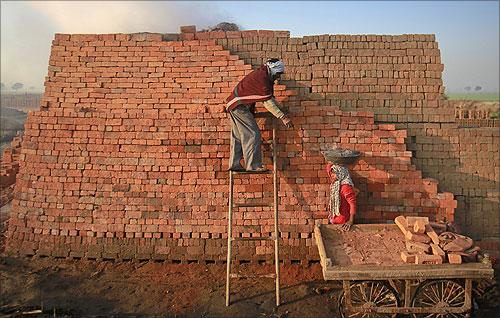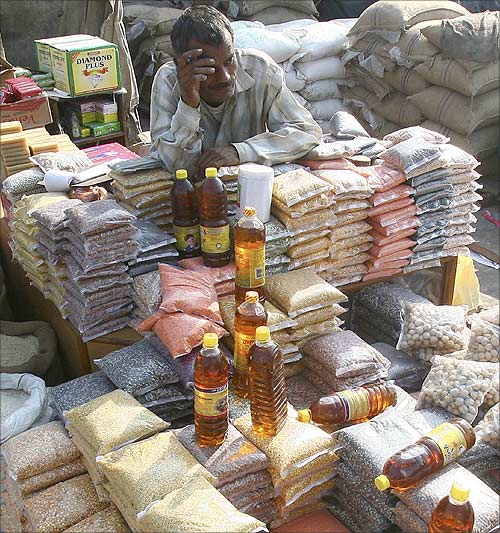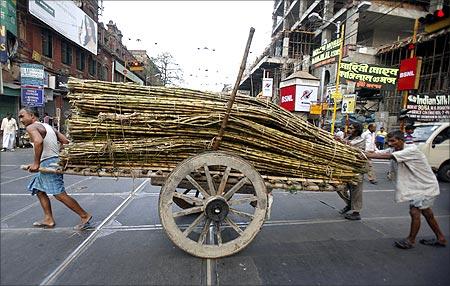Photographs: Danish Siddiqui/Reuters Sheela Bhatt
'If you use elections as an excuse to remain completely inactive,' former RBI deputy governor Subir Gokarn tells Rediff.com's Sheela Bhatt, 'then it will be disastrous for the economy.'
Subir Gokarn is not a typical economist. He is considered both an economist and a thinker.
He was appointed deputy governor of the Reserve Bank of India aged just 49 and supervised India's monetary policy.
Many were stunned when Dr Gokarn, now the Director (Research) at Brookings India, a New Delhi-based think-tank, was not given a second term at the RBI that he richly deserved.
In an exclusive interview with Rediff.com's Sheela Bhatt Dr Gokarn shares his views on the Indian economy, India's gold policy and the proposed Food Security Bill.
What is your take on the global economic scenario?
We are obviously going through some difficult times, and this is partly due to global turbulence and risks, and that has not abated yet.
However, over the past one year or so, concerns about the global meltdown have certainly receded.
The US economy is clearly performing somewhat better than a year ago and even though European fiscal issues are still being resolved, the panic situation seems to be behind us.
National governments of the countries in the European Union, and heads of European central banks are taking necessary steps to ably support their economies.
Fired by prices of food items, inflation in India continues to remain high, and this will remain a pressure point on the system.
Non-food inflation, though, is coming down if you go by the Wholesale Price Index numbers.
The country further faces pressure on both the fiscal and balance of payment fronts.
Both these are related to high oil prices and the subsidies that the government extends to petroleum products.
Of course, steady rise of diesel prices, and the fact that there has been a sharp drop in crude prices in the last few days will definitely help both on the current account and the fiscal side.
However, there are some nagging issues that are unfortunately not being dealt with the necessary urgency.
While the country's dismal food situation tops the list, India's crumbling infrastructure requires prompt action.
We are not only falling far behind on the infrastructure demand-supply balance, it is also hurting the financial system, as most of these projects have borrowed heavily from banks.
There are a number of issues on which quick action needs to be taken and the government must keep moving ahead on these fronts.
Since gold and oil prices are coming down, do you think it will help improve the other economic figures?
Can India go to the polls with 6 per cent plus GDP growth?
Elections are not something that we need to be or should be focused on because then there is the temptation to say nothing is going to happen before the polls, and that gives everybody an excuse to do nothing.
Elections are a matter of routine. They are not a surprise, they are not a shock, they are not even an unanticipated development. The system has to deal with elections every five years.
If policies become hostage to elections, we will never make any progress.
There are certain priorities and compulsions.
The economy is going through some difficult times and certain actions need to be taken to address that.
It is the responsibility of the government -- irrespective of whatever time is left in its term -- to take the decisions necessary to get things back on track.
There will be some mistakes, but if you use elections as an excuse to remain completely inactive, then it will be disastrous for the economy.
I don't think we can afford to wait for another year or more before we start taking action on all these fronts.
Fortunately, some actions are being taken, and the finance minister, instead of presenting a populist (or election-friendly) Budget, acted prudently, and did not go overboard.
The government obviously realised that any such move would have significantly increased the risk of macroeconomic instability.
By the same logic, prompt action is necessary as far as infrastructure projects, and food procurement and the pricing framework are concerned.
We cannot afford to wait for long.
...
Exclusive! How to SAVE India's economy
Image: A grocery market in ChandigarhPhotographs: Ajay Verma/Reuters
There are two schools of thought as far as subsidies are concerned.
The school that supports it says applications like Aadhaar will help India streamline subsidies.
The other group slams the very notion of subsidies, terming it a real burden on the economy. What is your view?
This is really a very critical question. While it's perfectly reasonable to subsidise certain things, it is equally important to ensure that the subsidies eventually reach the target segment.
If we have two things going astray -- one, wrong things being subsidised and two, whatever is being subsidised actually benefitting the wrong group of people, then I think the system has failed because it is not delivering its welfare objective.
Subsidies are legitimate part of any development policy framework, but you have to apply some very explicit and stringent criteria so that the right things are subsidised and the delivery mechanism works perfectly to ensure that these subsidies reach the right target.
As an economist, how do you see food security provision as an economic dream?
We have to start off with a basic question here -- what does food security mean?
There are two ways to look at it. One is what I would call crisis management food security.
In the event of a natural disaster, for instance, you have to ensure that the affected people are getting enough to survive for at least the length of the time during which the system is disrupted.
This may be for a few weeks or a few months, during which you have to ensure that you have both the capacity and the capability -- that is, the food is available and the delivery system works properly.
But we can also talk about longer-term food security. Here, we have to think differently. We have to think not about food security per se which is how the debate has evolved in the Indian context but what I would call 'nutritional security', which is when you want to offer people the assurance that they will not be deprived of nutrition.
It cannot be done by providing only rice and wheat, as these represent only one food group (carbohydrates), and they don't provide for proteins and other nutrients.
This issue also links up to food inflation, which is essentially being driven by proteins and vegetables.
As incomes increase, prices of these non-cereal items are rising perhaps even faster and this may be depriving people of adequate supplies of proteins and other non-carbohydrate nutrients.
In short, we have to find a balance and just supplying more rice and wheat is not going to achieve that.
...
Exclusive! How to SAVE India's economy
Image: Gold rings displayed at a jewellery shop.Photographs: Truth Leem/Reuters
Are we capable of handling it?
To start off, we must produce more dal, milk, eggs, poultry, fish, meat, vegetables and fruits.
We have a fixed area of agricultural land and if rice and wheat become attractive because the government procures them in abundance, other crops are going to be de-emphasised.
In effect, by increasing incentives for cereal production, you are actually taking away resources that could be used for producing other things.
As a result, the prices of cereals may be kept in check, which, undoubtedly, is a positive sign since they are the most basic nutritional requirement, but the prices of everything else will go up.
Prices of proteins and vegetables have been going up very sharply for the past five years and that is the basic driver of food inflation.
So, if food security is viewed purely from the cereal perspective, then we are ignoring both the welfare consequences of inadequate supplies of other food items and also the macro-economic consequences.
It, thus, becomes difficult to manage the inflation scenario when food inflation is so high and stubborn.
Are India's rich mostly responsible for importing gold, a burden on the country's economy?
I also read that some kind of cartel between Saudi Arabia and some South India-based banks are behind this spurt in gold demand.
What is your view?
I don't have the expertise to pass judgement on cartels. We have to interpret the demand for gold in certain ways.
The most obvious explanation -- though not the only one -- may be that the returns from gold are generally quite high, not just in an arithmetic sense, but also psychologically.
In India, this safe haven aspect is being compounded by many other domestic drivers.
One is inflation -- in a high inflation scenario, bank deposits do not give adequate returns. So, gold becomes an attractive alternative, because it is perceived to be a good hedge against inflation.
There is also a structural demand driver. With household incomes rising appreciably over the last ten years, there is enough scope for decent savings and because of its accessibility, the first asset class that most Indians reach out to is gold.
From a policy perspective, you can react to this in two ways. One, to somehow slash or clamp down on gold purchases, which is completely wrong. No government has ever had any success in controlling the flow of the yellow metal.
The other is if savers want the attributes of gold as an asset, then we can give them something that mimics gold without requiring the physical import of the commodity.
This is what I would call de-materialising gold.
We have to explore whether this is viable or not, and if there is any barrier to introducing such products, the regulators should be willing to eliminate them.
Secondly, there is a lot of idle gold that do not get cash returns. The prices may be going up, but what use is it to a person who needs a cash flow?
So, how do you convert gold into cash flow?
We have to get into something like gold deposits where the bank that takes the gold deposit has the right to melt the gold down, sell it or do whatever and when the person redeems the deposit, he may take it back in physical gold, but not in the form he deposited or as a cash equivalent.
It is estimated that Indian households have roughly 20,000 tonnes of gold. Imports are about 1,000 tonnes a year.
Even if a small percentage of it comes into the system, it can significantly reduce the current account deficit.
...
Exclusive! How to SAVE India's economy
Image: Labourers transport sugarcane in KolkataPhotographs: Parth Sanyal/Reuters
India will go to the polls in less than a year's time. Each time during elections, state governments bend backwards to offer freebies like free television sets, free cycle etc to woo voters.
As someone who understands governance, thye economy and financial management, how do you look at such freebies?
I think it's really a question of affordability.
I don't question the right of the government to design and implement welfare schemes. The question is whether it can afford to do so.
If you are giving away things for free in a situation where the state finances are in doldrums, then such freebies actually hurt the prospects of sustainability.
So, instead of delivering a long-term package of welfare services that will actually make a difference to people's lives, you are actually trading that off for a one-time benefit.
In the process, you miss out on better schools, transportation, medical care, law and order.
Voters need to think in terms of these trade-offs and I think they often do so, which is why freebies don't always work in terms of getting incumbents re-elected.
India has come a long way since 1991, when the then finance minister Manmohan Singh decided to open up India's economy.
Looking back, how do you see our position then and now?
I think the cliche of the glass is half empty is appropriate. In 1991, many things that we are seeing today couldn't have been visualised. In the financial sector, for example, the kind of products and services that are available now, were unimaginable then.
Telecom is another phenomenal achievement. All these are powerful symbols of positive change, but there are also many areas where the promise has simply not been realised.
We have not been able to put a large proportion of our employable population to work in desirable or ideal jobs.
There are skill, infrastructure and policy issues.
All these things are holding us back.
Ultimately, it's not just GDP growth that's a measure of your success, it's also the number of people who benefit from high growth and how evenly and how robustly those benefits flow through the system.
We have lot of ground to make up and I hope that is going to be the focus.
There are ways in which you effectively redistribute, because you allow people to take advantage of the opportunities to increase their productivity and incomes.
That's the model that we need to implement, and that's the combination that we need to be focussed on.
Is our democratic and political set-up helping this idea?
I think democracy is an absolute necessity.
There is no debate or dilemma about democracy. There is no viable alternative to democracy.
I don't think the question whether democracy is helping or hurting is at all relevant.
What is relevant is whether governance is appropriate or not? And here, I can certainly sympathise with the view that it is not doing its job as effectively as it needs to.
One of the most important developments of the last 20 years is liberalisation that energised the private sector because of competition, exposure to the world, and emergence of new opportunities.
Unfortunately, the government still goes about doing its work in the same way it did before 1991.
Indian IT has contributed to increased productivity everywhere else in the world, but done relatively little to increase productivity in the Indian system.
These are sources of great frustration. There are, of course, parts of government that have improved, many of them dramatically, but as a system in totality, there is a huge gap waiting to be covered.





article